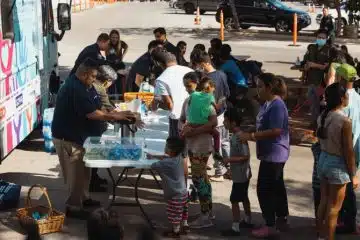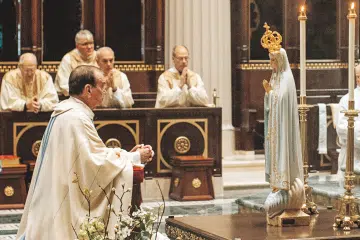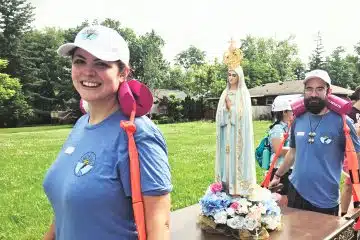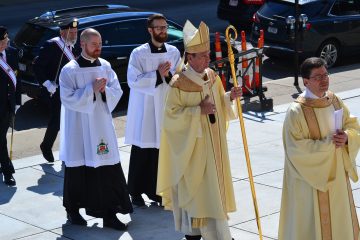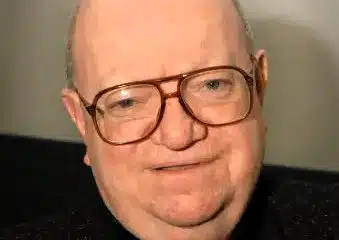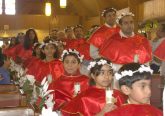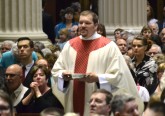Holy Week, Easter marked with ceremony, faith in other cultures

The remembrance of the passion, death and resurrection of our Lord is marked with special ceremonies, tradition and faith in other cultures, including those represented in the archdiocese.
Lan Vu, a member of Our Lady of Lavang Vietnamese Catholic Community in Cincinnati, said, “We try to do as much as we would normally do in Vietnam. It’s a lot bigger than Christmas. There is much that goes on during Holy Week. We treat it as if Jesus and Mary are still with us.”
Leading up to Holy Week, she noted, there is an emphasis on giving alms as a community activity throughout the Lenten season. “Everything has to do with the community,” Vu explained. “In Vietnam, we would cook and deliver rice to the poor. Here, we collect money and send it back to Vietnam to help the churches and people in need.”
While the Stations are the Cross are a beloved Lenten devotion for all Catholics, the Vietnamese have an additional practice that combines ancient chants with traditional prayer. Before the Good Friday service, Vu explained, there are a total of 15 lamentations that recount the passion of Christ. They differ from the traditional stations, focusing more on what occurs at the trial of Jesus before Pontius Pilate and on the cross at Calvary, rather than what happens in between.
“We want everybody to participate in this, especially the children, so they know that our sin caused this,” Vu said.
“We have the knowledge that we are sinners, but that we’ll be forgiven. It brings into our hearts how Jesus suffered to save us. We are reliving His experience. We are reliving our faith.”
During Easter Vigil, she said, before the lights come on, people gather to decorate the alter. “They bring out the flowers. Then the lights are turned on and we sing. It’s a big celebration. Easter Sunday is a day of joy and jubilation.”
In his native Rwanda, Father Lambert Ulinzwenimana, parochial vicar of the Winton Wyoming Pastoral Region, said the celebration of Easter is “the highlight of the liturgical year. You can see that in the preparations.”
During Holy Week, there are long lines of men, women and children at every church ready to receive the sacrament of reconciliation. “Going to confession before Holy Thursday is very important to the people,” Father Ulinzwenimana said, noting that outreach to others also takes on special significance as Rwandan Catholics prepare for Easter, from visiting the sick to taking up collections for the poor in neighboring communities.
During the Chrism Mass, commendation of extraordinary ministers of the Eucharist takes place as they receive official letters for their ministry. “This is something that is very important for the community. They really value this ministry.”
In Rwanda, known as “The Land of a Thousand Hills,” in nearly every parish on Good Friday, there are processions from the church to the foot of the mountains, with people praying the Stations of the Cross and the rosary as they remember Christ’s journey to Calvary.
“We follow Jesus to learn from Him how to forgive those who have offended us,” Father Ulinzwenimana said. “It’s a day for spiritual healing, for people to share the stories of how they have found healing through Jesus. It’s a very holy day.”
Holy Week is marked with additional solemnity when it falls near April 7, marking the beginning of the Rwandan genocide in 1994, and now a time of mourning and remembrance for the victims. “We celebrate more quietly. It’s a time to grieve and to pray. Many people lost their loved ones,” he explained.
Father Ulinzwenimana said the celebration of Holy Week and Easter is particularly meaningful to the Rwandan people because of their experience of war. “They know what suffering is, so on Good Friday, they join in suffering with Jesus. But, the celebration of new life in Jesus also gives new meaning to their concept of life.”
Easter Vigil brings peace and joy, he said, as people bring candles that are blessed during Mass and “find the light of Christ.” Many of the faithful then light their candles at home to bring that light to those who couldn’t attend Mass.
He recalls Easter Vigil during his time as seminarian, and the scene of 200 men dressed in white cassocks, all gathered around the fire. “That really made my memories — the joy of the celebration, the beauty, the dancing and the drums.”


